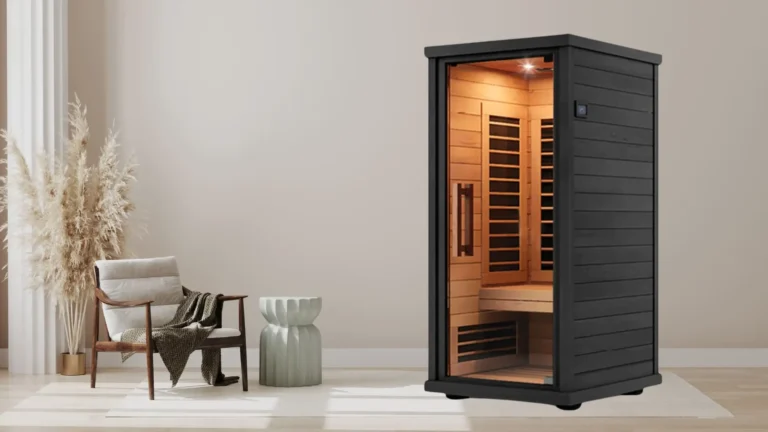Sauna for Anxiety: Relax and Reduce Stress Naturally

Did you know that about one in four Americans get insomnia each year1? Chronic stress really hurts our mental health and well-being. So, finding natural ways to ease anxiety and find tranquility is key for many.
In this article, you’ll discover how using a sauna for anxiety can provide natural relief. Sauna therapy reduces stress by lowering cortisol, our main stress hormone, and releasing endorphins, which are natural mood boosters. The heat of saunas relaxes muscles and boosts mood and mental focus.
Studies show that using saunas often can make people feel less tired, less depressed, and less anxious. Sauna therapy helps create a calm mind, making it a good choice for fighting anxiety and improving mental health and well-being.
| Medical Disclaimer The information provided in this article is for educational purposes only and is not intended as medical advice. Always consult with a qualified healthcare professional before starting any new health regimen, including the use of saunas. The author and publisher of this content are not responsible for any adverse effects or consequences resulting from the use of any suggestions, preparations, or procedures described in this article. |
Table of Contents
Understanding Anxiety and Anxiety Disorders
Anxiety is a complex emotional state filled with tension, worry, and fear about the future. It can turn into chronic anxiety, leading to different disorders.
These include generalized anxiety disorder, Panic disorder, obsessive-compulsive disorder, and more. Each disorder has its own symptoms, like excessive worry, racing thoughts, and physical signs like a fast heartbeat.
Anxiety affects mental health deeply. It can lead to depression, insomnia, and substance abuse. Knowing the symptoms of anxiety is key to finding relief. It’s very important to understand how anxiety shows up differently in people.
If you’re new to saunas, start with my comprehensive guide on what a sauna is.
Do Saunas Help with Anxiety? Understanding the Science
Sauna therapy is becoming a key tool for easing anxiety symptoms. It helps with generalized anxiety disorder (GAD) and panic disorder. Regular sauna use can greatly reduce anxiety, helping with emotional symptoms, too.
Alleviating Symptoms of Generalized Anxiety Disorder
People with GAD worry too much and get easily irritated. Studies show sauna therapy can lessen these feelings, making moods better after use. To get the most benefits, it’s best to go to the sauna 2-3 times a week.
Going to the sauna often can also lower stress hormones. This helps people relax and feel less emotional stress.
Sauna Usage and Panic Disorder Management
Panic disorder causes sudden, intense fear and physical symptoms like a fast heartbeat. Sauna therapy can calm people down, helping them handle panic attacks better. It also boosts brain chemicals that help manage stress, making people more resilient mentally.
The Physiological Effects of Heat on the Body
The heat in saunas relaxes muscles and boosts blood flow, helping reduce anxiety symptoms. Saunas also release endorphins, making us feel happier. Regular use can even slow down age-related diseases and improve brain function2.

Understanding Cortisol: The Stress Hormone
Cortisol is our main stress hormone. Sauna therapy lowers cortisol levels, helping us relax and reducing stress. The Cleveland Clinic says lowering cortisol is key for better mental health3. It helps us handle stress better and feel more emotionally stable.
The Role of Brain-Derived Neurotrophic Factor (BDNF)
BDNF is essential for brain health and growth. Saunas increase BDNF levels4, protecting against stress damage. More BDNF means better mental clarity and resilience against anxiety and stress. Studies show saunas improve mood and brain function, boosting mental well-being.
The cozy sauna environment helps people forget their worries, leading to a sense of calm. This combination of physiological and psychological effects makes sauna therapy a promising tool for anxiety relief.
Physical Benefits of Using a Sauna For Anxiety Sufferers
Sauna use offers many physical benefits that help manage anxiety.
Improved sleep quality and its impact on anxiety
There’s a strong link between good sleep and less anxiety. Better sleep helps keep the mind balanced, making it easier to handle daily stress. Saunas promote deeper sleep, which boosts overall well-being and emotional health.
Muscle relaxation and tension relief
Sauna use also relaxes muscles, reducing muscle tension. This relaxation helps both the body and mind, providing essential stress relief5. It also releases endorphins, making us feel happier and more relaxed.
Cardiovascular benefits and their relation to anxiety management
Regular sauna use improves heart health, which is key for managing anxiety. Studies show that saunas enhance blood flow and brain oxygenation, which is important for clear thinking and emotional balance. Sauna therapy can lower blood pressure and improve heart health, supporting the fight against chronic stress and anxiety.
Mental Health Benefits of Regular Sauna Sessions
Regular sauna sessions are great for your mental health, leading to better overall well-being.
Stress reduction and cortisol regulation
Sauna use is linked to stress reduction. It lowers cortisol levels, the body’s stress hormone.
Studies show that using a sauna five to 15 times a month boosts mental well-being scores.
Consistent sauna sessions also release endorphins, which are natural mood boosters. These effects help you feel calm and relaxed.
Mindfulness and meditation opportunities in the sauna
The sauna’s serene environment is perfect for mindfulness practices. It encourages focusing inward, practicing breathing exercises, and meditating. These activities improve mental clarity and enhance tranquility, leading to a positive mindset.

Improved mood and overall well-being
Regular sauna sessions improve mood. Research shows that sauna users experience mood disorder symptom reduction.
Dr. Jeffrey Lieberman‘s studies found a 50% decrease in symptoms for those with major depression after one infrared sauna treatment.
Nearly 1 in 5 Americans face mental health issues, making effective treatments like sauna bathing important.
Sauna bathing relaxes the body and boosts mental health, improving overall well-being.
Types of Saunas and Their Effectiveness for Anxiety
Knowing the different saunas can help you choose the right one for anxiety. Each type has its own benefits and experiences. They cater to different preferences and needs.
Traditional Finnish saunas vs. infrared saunas
Traditional Finnish saunas have high temperatures, from 150°F to 195°F (65°C to 90°C), and low humidity. This environment helps relax and fight anxiety.
Infrared saunas, on the other hand, use infrared light to heat the body directly. This is more comfortable for those who can’t handle high heat, yet they also offer mental health benefits.
Also Read: Best Infrared Saunas of 2024
Dry saunas vs. steam rooms
Dry saunas use only dry heat to induce sweating and relaxation. Steam rooms, with their moist environment, help relax and improve breathing.
Both can create a calm atmosphere, reducing stress and anxiety.
Related: Dry Sauna Vs Wet Sauna
Portable sauna options for home use
Portable saunas are becoming popular for home use. They are easy to set up and use. Regular use, aiming for 2-3 times a week, can help with anxiety relief. Plus, they offer the convenience of being portable.
Related: Best Portable Saunas in 2024
How to Use a Sauna for Maximum Anxiety Relief
Regular sauna use can help manage anxiety well. Here’s how to make your sauna time as effective as possible.
Recommended duration and frequency of sauna sessions
- Start with 15-20 minutes per session to get used to the heat.
- Try to go to the sauna 2-3 times a week.
- As you get more comfortable, you can stay longer.
This routine can help lower anxiety by balancing cortisol levels and promoting calmness, which is key for mental health.
Recommended Sauna Temperatures for Relief
Saunas can heat up to 150-195°F (65-90°C). Beginners should start with infrared saunas at 120-140°F. As you get used to it, you can increase the sauna temperature for better anxiety relief.
Proper hydration and safety precautions
Drinking water is key to enjoying sauna benefits. Make sure to drink water before, during, and after your sauna time to avoid dehydration.
Following safety tips, like not staying too long and listening to your body, makes sauna use safe and fun.

Complementary Techniques: Enhancing Sauna Benefits
Adding mindfulness meditation and breathing exercises to sauna sessions boosts relaxation and mental health. They make the sauna experience even more beneficial.
Mindfulness Meditation Practices in the Sauna
Mindfulness meditation keeps us aware of our thoughts, feelings, and body sensations. In the sauna, it involves focusing on breathing and imagining peaceful places.
This practice relaxes us and helps manage anxiety by shifting our focus away from stress. Using meditation in the sauna turns it into a place for mental clarity and emotional health. It’s a way to find peace and calm in a busy world.
Breathing Exercises for Stress Reduction
Breathing exercises are great for reducing anxiety. They help lower heart rates and calm the mind. Techniques like deep belly breathing promote relaxation by controlling breathing.
Regular use of these exercises improves health by increasing oxygen flow and relaxation responses. It makes the sauna experience even more therapeutic.
Potential Risks and Considerations
Sauna therapy is known for its benefits, but it’s important to consider the risks.
Medical conditions that may contraindicate sauna use
Some health problems, like heart disease and breathing issues, can be risky in saunas. Those with heart disease should be careful and consider their health when using a sauna.
New sauna users, including those with health issues, should start with short sessions of 5-10 minutes. They can then gradually increase the time.
Dehydration
Drinking plenty of water before, during, and after your sauna session is important to avoid dehydration. Dehydration can harm your health.
Interactions with medications and supplements
Sauna use can cause problems with medications that affect heart rate or blood pressure. It’s important for people taking these medications to understand the risks of heat. Before starting sauna therapy, it’s wise to talk to a doctor about any medication concerns.
When to consult a healthcare professional before starting sauna therapy
It’s a good idea to talk to a doctor before using a sauna, even more so for those with anxiety or panic disorders. Heat can make symptoms worse. A doctor can give advice tailored to your health, making sauna therapy safer and more enjoyable.
Conclusion
Summing up, sauna therapy does more than just relax the body. It’s key for easing anxiety and boosting mental health. Regular sauna use for 15-20 minutes can really help lower anxiety and depression symptoms.
People who use saunas often see better moods and emotional health, showing in their mental well-being scores. Recent studies also show that sauna therapy helps balance the mind. It can even lower stress hormones and tackle stress’s physical effects.
By making sauna therapy a part of your routine, you help with anxiety and build a wellness-focused life. It’s a way to deal with stress better and improve your mental health.
Resources
- https://www.pennmedicine.org/news/news-releases/2018/june/1-in-4-americans-develop-insomnia-each-year ↩︎
- https://www.ncbi.nlm.nih.gov/pmc/articles/PMC10681252/ ↩︎
- https://my.clevelandclinic.org/health/articles/22187-cortisol ↩︎
- https://www.foundmyfitness.com/topics/bdnf ↩︎
- https://health.clevelandclinic.org/sauna-benefits ↩︎

“Become a Sauna Expert Overnight!”
Grab Your “FREE” Sauna E-book NOW!
Get your hands on the ultimate sauna manual. From history to DIY setups, our free guide has it all.

As a Chartered Accountant turned sauna enthusiast, I bring a unique blend of analytical skills and hands-on experience to the world of heat therapy. With over a decade dedicated to researching and testing sauna products and practices, I’ve developed a deep understanding of this field. A the founder of HomeInDepth.com, I provide reliable, easy-to-understand information on all aspects of saunas. My goal is to guide you through every step of your sauna journey, offering meticulously researched, unbiased advice to help you make informed decisions and create your perfect sauna experience. I’m always happy to hear from sauna lovers like you—feel free to leave questions or share your own tips in the comments below so we can learn together. Contact me on:







4 Comments